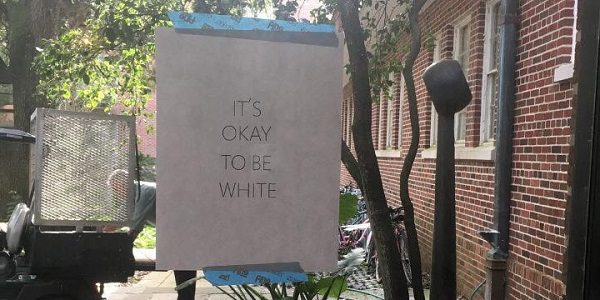Apparently there is a national movement started by white nationalists in the netherworld of 4chan to post sheets of paper on college campuses and other places that say, “It’s okay to be white.” This message appeared in several locations at Tulane this morning. The strategy according to the call to action is to bait politically correct leftists into lashing out against it so that “normies” can be recruited for the white nationalist cause. So what about the statement in and of itself. Is it valid? It depends on how we understand what’s being said and the context in which it’s being said.
Is it okay to be white? Of course it’s okay to be white. What’s not okay is to behave the way that many un-self-aware white people behave towards people of color, because these behaviors result in harm, ranging from mild irritation to loss of life in a police encounter. Not every white person exhibits these behaviors all the time. Some white people have their eyes opened to racialized social dynamics that help them change their behavior. Some white people simply inhabit the world with enough humility, teachability, and empathy that they’re able to avoid being harmful without an explicitly racial consciousness.
A good rule of thumb for determining if you belong to the #NotAllWhitePeople club is that you don’t feel the need to say #NotAllWhitePeople. If you’re triggered and offended by racial conversations, then there’s an underlying defensiveness in your consciousness that you should pay attention to. If you get a lot of pleasure out of calling other people fragile snowflakes, then you’re probably the one who’s a fragile snowflake.
This is a place where I think Christian theology can be helpful if it’s properly understood. Christianity asserts two paradoxically simultaneous truths about human nature. On the one hand, every human being is created in the image of God, which is an incredible claim that humanity essentially shares in God’s divinity. On the other hand, we believe that every human being is unavoidably corrupted by original sin, that is the legacy of our ancestors’ sin that creates complex social and psychological toxicities in our communities we simply cannot opt out of inheriting. Many white Christians say they believe in the doctrine of original sin in the abstract, but they’re virulently resistant to the historicized application of original sin to the racial dynamics in our country. If you don’t believe in historically contextual variations of original sin, then you don’t actually believe in original sin.
Every single white person, just like every other human being, is a uniquely precious, infinitely valuable image of God. So in that sense, there is no shame in being white or any other category of human. But it’s also the case that whiteness is a socialization by which a specific legacy of repressed guilt, entitlement, and defensiveness is inherited as an original sin that uniquely corrupts every white baby who is born into our American context (“whiteness” does not exist as the same social reality in any other culture). Whiteness as a toxic legacy is not okay, so in that sense, being white is not okay. Or rather, every white person needs to be able to say, “I’m not okay” in order to be liberated from the shame and defensiveness that our ancestors’ sin has bequeathed to us.
Another sense in which whiteness is not okay is in the peculiar claim that Western European civilization has made about itself since the Enlightenment. After generations of fierce religious warfare, Europeans sought out a way of being human that transcended tribal loyalties and cultural particularities. They developed the idea that humans could come together under the banner of reason and develop generic, universalized forms of thinking, which today we just call science. A lot of good came out of this turn toward reason and the advent of the scientific method. The problem was the superiority complex that it created for white men. They analyzed and categorized every other human culture, but they themselves were above culture since they were simply men of reason. To be a scientist meant putting everyone else under the microscope while putting yourself outside of the universe as the expert, impartial observer.
So one of the tricky things about whiteness is that it’s an identity formed by disavowing your own subjectivity and particularity. White people are not a culture; we’re just people in general. Black people are always identified as black because they’re a deviation from the norm of whiteness. So insofar as whiteness is a norm and a self-disavowing superiority complex, it’s not okay.
A final thing that needs to be said is that whiteness is toxic to the degree that it is anxious and fearful. When white people are arrogant, rude, patronizing, or offensive, it’s because they aren’t comfortable within their own skin. They don’t need self-hatred; they need self-acceptance. They need a community filled with grace where they can unlearn the toxic, harmful behavior that they’ve inherited due to their ancestors’ sins. So in this sense, it’s important to say, yes, it’s okay to be white. You’re okay. You’re a beloved child of God. You don’t need to walk on eggshells. You can learn how to be safe for people of color.
That doesn’t mean that people of color need to be inhibited from calling out harmful behavior and advocating for themselves. That doesn’t mean that people of color need to educate or accommodate white people. It does mean that white people who have learned healthy ways of interacting with people of color need to be gracious and humble with our fellow white people, instead of swelling up with self-satisfied “wokeness” and lashing out self-righteously against our own kind. I haven’t always done a good job of this. I suspect that toxic “wokeness” is a phase that racially conscious white people have to go through in our journey. But we need to get over it.
So in conclusion, yes, it’s okay to be white. The world desperately needs white people to be okay with themselves before our collective neurosis triggers a nuclear war or worse. You will know that you’ve become okay with yourself when you stop having defensive meltdowns every time people of color talk about their lived experiences and instead you embrace every opportunity to learn how to be a safer, more empathetic person for others.
Check out my book How Jesus Saves the World From Us!
Subscribe to our podcast Crackers and Grape Juice!
Support our campus ministry NOLA Wesley!













